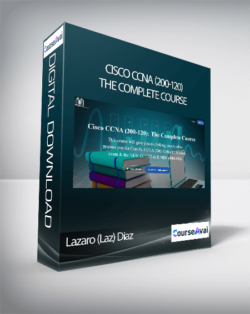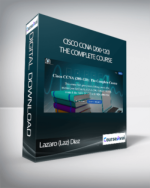Cisco CCNA (200-120): The Complete CourseThis course will give you everything you need to prepare you for Cisco’s, CCNA (200-120) certification exam & the NEW CCENT or ICND1 (100-105)Purchase Lazaro (Laz) Diaz – Cisco CCNA (200-120): The Complete Course courses at here with PRICE $149 $40Lazaro (Laz) Diaz – Cisco CCNA (200-120): The Complete CourseThis course is over 35+ hours long and will cover all the needed subjects to be successful in passing the CCNA 200-120 exam.But, it will also help the student prepare to pass Cisco’s NEW CCENT / ICND1 (100-105) certification exam.LET ME EXPLAIN:This course has been updated to reflect everything you need for Cisco’s new CCENT or ICND1 (100-105) certification exam.Please keep in mind that the 200-120 course is still about 80% accurate for the new CCNA 200-125 certification exam.Students will acquire the knowledge and practice labs in this course to make it transferable to real world use, as a Cisco and/or IT Professional.DISCLAIMER: Please note that the simulators/emulators used in this course are not part of the course.It is the students responsibility to copy my labs and practice with them. “Practice makes perfect!”The Cisco Packet Tracer & VIRAL (Virtual Internet Routing Lab) are Cisco proprietary software and can only be obtained through Cisco.But have more options that those. They can create their own lab with real equipment, get BOSON or GNS3.It is up to each student to obtain the simulator/emulator of their choice to study along with this course.Please also NOTE:.pkt files are not up-loadable to GlobED’s site.This means you would have to replicate my labs on each lecture here, in order to practice and follow along.This course will give students an in-depth understanding of networking, using routers and switches and their various configurations and connections. Students will learn how to configure; default, static and dynamic routing. Students will comprehend how to manipulate each of the routing protocols attributes to meet the requirements of the network.This course will also prepare the student in Layer 2 technology and its various configurations, such as; VLAN’s, VTP, STP, PortFast, EtherChannel, Port-Security, Inter-VLAN communication & Trunking.Students will also acquire the knowledge needed to secure their routers through the use of Access-list, configuring the different types of NAT & will be able to manage the router’s components.Students will also be able to thoroughly grasp the concepts of both Internet Protocols; IPv4 & IPv6.Wide Area Network Protocols will also be covered; HDLC, PPP & Frame Relay. The student will also learn how to create redundancy in their networks through the use of Redundancy Protocols such as HSRP which is just as important. Also, within the WAN, the student will also learn how to create VPN’s and GRE Tunnels.This is a full comprehensive course that will take you from A-Z in your quest for the CCNA (200-120)…and the new CCENT or ICND2 (100-105).About “the book”:Throughout the course, you will hear me mention “your book”, “a book” or “the book”…and if you’re wondering why I don’t mention a name…it’s because this was done on purpose.I don’t want anyone to purchase a book if you already have one…all CCNA study guides cover the same topics in different manners. So if you already have a CCNA book, you can use it with this course.However, for those that wonder which book I use in this course…here they are:Cisco Press book for the new – CCENT / ICND1 (100-105) Sybex book by Todd Lammle – CCNA 200-120 & his new book for the new CCENT / ICND1 (100-105)Amazon book by Lazaro Diaz – The Only IP Book You Will Ever Need!Students will have the best of both worlds…the information from the old exam and the information for the new exam CCEN or ICND1 (100-105)…and then some.Hope you enjoy the course!Laz 😉DISCLOSURE:I do not know Todd Lammle, I do not get referral fees and/or any compensation from him or Sybex, I just happen to think that his books are much easier to understand and follow. It is up to you (the student) to decide which book, if any, you want to use along with this course.Your InstructorLazaro (Laz) DiazThis can be the year to achieve your goals if you are serious about your certs!If you are determined, ambitious and hungry for a new beginning…then this should be your year…and how better to start or end the year than to get an IT Certification…Especially a Cisco CCNA, CCNP, Microsoft or a Network+ certification.Whether you are interested in the CCNA, the CCNP, Network+ or you just want to understand the key topics for these, taking one or ALL my courses, will get you a lot closer to that goal.But, don’t take my word for it…please look at the FREE previews (they are available in all my courses) and see for yourself.However, keep in mind that I’m also an author and you can find my books on AMAZON by searching under Lazaro Diaz.NOW…what you wanted to know about me but were afraid to ask:If you are tired of the same old methods of learning and want someone that is pretty much unconventional, but at the same time will provide you with an enjoyable learning experience in layman’s terms…then please preview my courses and you will discover that I am your guy.I am a Network Engineer with almost two (2) decades in the field and the teaching industry.So, if anyone can get you certified it’s me!My teaching experience stems from teaching at institutions like Palm Beach Community College, New Horizons, Florida Career College (now Anthem College) and The Academy of South Florida.However, here in GlobED.net, I bring the classroom to you.Courtesy of the internet, I have been teaching students from all over the world and all walks of life…. thank goodness for technology 😉Having been on all sides of the spectrum; as a student, a teacher/trainer, and in the field, I believe this uniquely qualifies me to understand you.I know firsthand what you have been exposed to as opposed to what you really want to accomplish. These two are sometimes extremely conflicting and frustrating. That is why I teach in the manner I do and can relate to your rejection of the Status Quo.Because I also do private contracting, I have extensive experience in helping and/or teaching corporate employees at Miami Dade County employees, MetroPCS (now T-Mobile), The Florida Marlins, Ulysse Nardin, Alberta Water Department (Canada), The Assurant Group, The US Airforce, Hospital personnel & Attorney’s firms. I’ve guided them to be able to acquire their IT certifications or general knowledge in IT and Networking.However, my expertise also extends to being able to teach applications as well. YES…I am also an application instructor and qualified to teach Word, Excel, PowerPoint, and Access. This, of course, includes the MOS (Microsoft Office Specialist) certification.As you can see, I am a multifaceted person and consider myself to be an eternal student as well.Remember that I too must keep up with technology since these changes seem to be daily, if not hourly.I teach in an unconventional way that allows students to understand the subject matter and can, therefore, not only prepare them for a Cisco certification exam but help them apply my methods in the real world.I strive to give the student a greater opportunity to be able to compete in the current job markets.Do I go above and beyond what is needed for a certification?…YES, I do…because it’s not only about getting a certification, but it’s also about making sure that you, the student, are prepared for a job interview and/or maintaining your current job by enhancing your skills.This is where I step in and make sure that you are prepared for whatever comes your way and make you become an asset to your employer.Everyone has different requirements and I make sure, or at least I try, to provide information for most scenarios.My classes and/or courses are very simple and that’s how I like to teach. I truly believe in “KISS“…NO, I don’t want to kiss you…this means “keep it simple stupid” –If things are kept simple, easily explained in a way that the student can grasp quickly and retain the information…then I have achieved my goal.For those that do not know me yet, you may not be used to my style of teaching, but you will soon get accustomed to it 🙂I’m very laid back, I try to make learning fun and I teach in layman’s terms…no physics jargon or mumbo jumbo in my teachings.My courses are very interactive and extremely dynamic…you will not find my lectures monotone or boring, because falling asleep, for lack of excitement, is just NOT an option and NOT who I am.Need convincing?Then just look for yourself at my video previews, which I always provide on ALL my courses. Therefore, you can then determine if I’m the right guy to help you get your industry-specific certifications.I certainly hope that after a careful review of my credentials & testimonials (you can Google me you know) …and see if I’m the Cisco Instructor you’re looking for!LazNetwork Engineer, Cisco, Microsoft, CompTIA Instructor, Author &Motivational EvangelistAuthor of: “The Only IP Book You Will Ever Need!” and “CCNA Routing and Switching 200-125 Certification Guide: The ultimate solution for passing the CCNA certification and boosting your networking career“, now on AMAZON or Packt PublishingCourse CurriculumCisco CCNA (200-120): The Complete CourseWelcome to the most COMPLETE CCNA (200-120) Course…get ready to be Amazed!S1L1 Journey into Cisco World (2:02)S1L2 Why acquire A CCNA Certification (2:58)S1L3 How would you get CCNA Certified (4:13)S1L4 Which CCNA test should I take? (6:33)S1L5 What does the course consist of? (6:23)The packet tracer simulatorS2L6 Navigating the packet tracer toolS2L7 how to create a simple topology (6:46)S2L8 CONFIGURING A ROUTER (3:21)S2L9 Configuring a switch (6:14)S2L10 Configuring a PC (6:24)S2L11 Configuring a server (5:35)The basics of networkingS3L12 understanding the need for Networking (4:42)S3L13 communication at its lowest layer (10:13)S3L14 Internetworking Devices used on a network (20:36)S3L15 The importance of segmentation (10:36)The OSI ModelS4L16 A brief history of the OSI model (2:53)S4L17 the layers of the OSI model (6:46)S4L18 The 3 upper layers of the OSI (8:07)S4L19 The 4 lower layers of the OSI (13:58)S4L20 The Process of Encapsulation (2:43)Binary to Hex and Decimal ConversionS5L21 The tables we use when converting (4:20)S5L22 Converting a hex number to binary:decimal (10:26)S5L23 Converting a decimal:binaryhex (6:26)S5L24 Why do we need to know hexadecimal numbers? (2:41)Cisco Three Layer ModelS6L25 Core layer (4:32)S6L26 Distribution layer (4:12)S6L27 Access Layer (5:57)TCP/IP ModelS7L29 the layers of the model and how they map over to OSI (4:45)S7L28 A brief history of the model (4:13)Ethernet NetworksS8L30 Definition of Ethernet (7:10)S8L31 The access method of ethernet (10:28)S8L32 What cabling standards do we use? (12:06)IPV4 AddressesS9L33 What is an IPv4 address and its format (9:24)S9L34 classes of address and their ranges (16:04)Private IP Address RangeS10L35 definition of private addressing (5:05)S10L36 private class A,B,C address ranges (14:48)IPv6 AddressingS11L37 Why do we need IPv6 (6:13)S11L38 IPv6 addressing and expressions (13:12)S11L39 IPv6 address types (10:06)S11L40 the auto-configuration feature (10:24)S11L41 ICMPv6 (5:26)Transition MechanismsS12L42 Dual Stack, 6to4 tunneling and NATPT NR (13:30)How to subnet in IPV4S13L43 The subnet mask (18:01)S13L44 the diagram we use to subnet (18:11)S13L45 Class full subnetting (9:36)S13L46 Class less subnetting (21:10)S13L47 Route summarization (23:46)S13L48 Wildcard masking (11:29)How to subnet in IPv6S14L49 do we need to subnet in IPv6? (3:36)S14L50 how to setup the diagram for subnetting (4:58)S14L51 Counting for subnets and finding increment value (4:50)S14L52 laying out the subnets with new network prefix (4:43)Inside aCisco RouterS15L53 How to connect to a router (8:52)S15L54 Components we need to know about (16:38)S15L55 Boot Sequence of a Cisco router (9:19)S15L56 Navigation of the IOS (12:58)Administrative ConfigurationsS16L57 House keeping configurations (30:30)S16L58 interface configurations (16:58)S16L59 telnet and SSH into routers (5:52)S16L60 Show commands (8:08)DHCP and Name resolution on Cisco RoutersS17L61 configuring DHCP (14:44)S17L62 Configuring DHCP relay agent (19:53)S17L63 configuring static host table (9:33)Using the Cisco Discovery ProtocolS18L64 using the CDP command (9:35)The Cisco registerS19L65 manipulating the register within the router (10:36)S19L66 Accessing & manipulating the register within ROMMON (12:15)Routing ProcessS20L68 what type of routing should i use? (9:55)S20L67 how does IP routing occur (13:36)S20L69 what are default routes & where do you configure them? (16:37)S20L70 configuring static routes on real routers (10:59)Dynamic RoutingS21L71 An overview of the three Dynamic routing protocols (19:49)S21L72 RIPv2 & RIPng configurations NR (49:20)S21L73EIGRP & EIGRPv6 configurations NR (48:44)S21L74 EIGRP Bandwidth Lab (17:51)OSPF DetailsS22L75 OSPF Terminology (21:20)S22L76 Point-to-Point OSPF (29:21)S22L77 Multi-access ospf NR (48:02)S22L78 OSPF multiple area details (22:32)Switching at layer 2S23L79 Purpose of using switches (17:38)S23L80 Navigation on a switch and show commands (14:00)S23L81 Administration configurations (8:35)The Basics Of VLANsS24L82 What are vlans and the importance of using vlans in our network? (11:09)S24L83 How to create and assign a vlan :Trunking appropriate ports (16:17)The Spanning-Tree ProtocolS25L84 what is STP used for? (6:15)S25L85 how does the STP election process work? (21:56)S25L86 how to manipulate the election process (8:28)S25L87 Turning STP off and Guarding against BPDUs on ports not using STP (10:53)The Virtual Trunking ProtocolS26L88 What is the purpose of the VTP protocol (12:36)S26L89 Commands and Configurations of the VTP protocol (14:24)S26L90 Turning on and adjusting port-security on your switch (7:08)Inter-vlan routingS27L91 what is the purpose on intervlan routing (11:56)S27L92P1 how to configure intervlan routing (34:09)S27L92P2 how to configure intervlan routing (22:37)Secure your enterprise using ACL’sS28L93 what is an ACL and its rules (12:56)S28L94 Standard ACL’s (20:25)S28L95 extended ACL’s (25:50)Network Address TranslationsS29L96 3 types of NAT (7:31)S29L97 how does NATs work (6:20)S29L98 Configure NAT Overload and Dynamic (7:53)S29L99 Actual Configuration of NAT Overload (7:29)S29L100 Pitfalls of NAT in CERT (5:44)Wide Area NetworksS30L101 what exactly is a WAN (7:13)S30L102 what are the connection types and how to justify it (11:22)Frame-Relay Packet switched technologyS31L103 understanding the CIR and Burst Rate (12:40)S31L104 what is a DLCI and who assigns it (9:27)S31L105 Configuring frame relay (24:56)S31L106 show commands frame relay (9:18)PPP Dedicated leased connection typeS32L107 PPP dedicated leased connection type (7:38)S32L108 PPP configuration (15:58)IP servicesS33L109 Redundancy protocols overview (12:37)S33L110 HSRP Detail and Config NR (43:43)S33L111 VRRP and GLBP (9:39)Managing DevicesS34L113 SNMP (21:54)S34L114 SYSLOG (11:44)S34L115 NETFLOW (8:34)Summary of the courseS35L116 THE SUMMARY (6:26)CCNA 200-120 Final ExamNew Section Explaining EtherChannelS36L117 Introduction to EtherChannel (0:44)S36L118 What is EtherChannel? (3:49)S36L119 EtherChannel Lab (12:45)S36L120 Summary of Section (2:29)Cisco’s NEW CCENT or ICND1 (100-105) certification topics covered.S37L121 Intro To ICND1 Course (6:17)Intro to TCP/IP NetworkingS38L122 Intro To Section (3:50)S38L123 Foundational Topics (8:43)S38L124 Overview Of TCP:IP Network (20:10)S38L125 Summary of Section (3:25)QUIZFundamentals of Ethernet LAN’sS39L126 Intro to Section (3:34)S39L127 An Overview of LAN’s (20:22)S39L128 Ethernet Physical Layer Standards (10:16)S39L129 Identifying network layer information (3:47)S39L130 Summary of Section (7:19)QUIZFundamentals of WANS40L131 Intro to Section (2:02)S40L132 Leased Line WAN’s (14:15)S40L133 Basics of HDLC Protocol (5:46)S40L134 Ethernet as WAN Technology (4:46)S40L135 Accessing the Internet (10:24)S40L136 Summary of Section (5:37)QUIZFundamentals of IPv4 AddressingS41L137 Intro to Section (4:53)S41L138 Why is IP Addressing important? (5:36)S41L139 Classes of IPv4 Addresses (8:05)S41L140 Private Range of IPv4 Addresses (6:58)S41L141 Assigning IPv4 Addresses (8:45)S41L142 IPv4 Subnetting (12:53)S41L143 IPv4 routing (9:56)S41L144 Routing in IPv4 (7:55)S41L145 Routing Protocols (7:18)S41L146 Summary of Section (4:49)QuizIntroduction to the CLIS42L147 Intro to Section (7:00)S42L148 Accessing the CLI of a Router or Cisco Switch (10:30)S42L149 Switch Basic Administrative Command (11:32)S42L150 Router Basic Administrative command (9:18)S42L151 LAN Switching Concepts (6:15)S42L152 The Spanning tree protocol (14:56)S42L153 Configuring Switch Interfaces (22:04)S42L154 Implementing VLAN’s (12:07)S42L155 Inter-Vlan Configuration (8:15)S42L156 Summary of Section (5:40)QUIZManaging a Cisco InternetworkS43L157 Intro to Section (4:11)S43L158 Components of a Cisco Router (13:13)S43L159 Managing the Cisco Register (8:07)S43L160 Backing up and Restoring Cisco Configuration (17:02)S43L161 Monitoring your network (12:46)S43L162 Name Resolution (6:22)S43L163 Summary of Section (3:43)QUIZManaging Cisco DevicesS44L164 Intro to Diferent Services of the Cisco IOS (12:19)S44L165 Summary of Section (2:00)QUIZDynamic Routing ProcessS45L166 Intro to Section (1:44)S45L167 Dynamic Routing using RIPv2 (10:25)S45L168 Dynamic Routing Protocol Using EIGRP (6:45)S45L169 Dynamic Routing using OSPF (10:03)S45L170 Summary of Section (5:57)QUIZSecuring your NetworkS46L171 Intro to Section (1:11)S46L172 Using Hardware to Secure the Network (7:33)S46L173 Introduction to ACL’s (5:07)S46L174 Standard ACL’s (12:44)S46L175 Extended ACL’s (13:17)S46L176 Named ACL’s (7:34)S46L177 Remarks (3:45)S46L178 Monitoring ACL’s (5:18)S46L179 Summary of Section (3:22)QUIZIntroduction to NAT ProtocolS47L180 Intro to Section (1:16)S47L181 Why do we use NAT? (3:14)S47L182 Types of NAT (3:41)S47L183 NAT Names (3:30)S47L184 Configuration of NAT (9:49)S47L185 NAT Troubleshooting (4:24)S47L186 Summary of NAT (2:53)QUIZIntroduction to IPv6S48L187 Intro to Section (4:35)S48L188 Do we need IPv6? (4:55)S48L189 IPv6 Addressing and Expressions (4:57)S48L190 Shortened Expressions (4:10)S48L191 Address Types (6:12)S48L192 Special Addresses (4:21)S48L193 Configuring IPv6 Addresses (9:18)S48L194 IPv6 Subnetting (11:15)S48L195 routing in IPv6 (4:13)S48L196 ICMPv6 (4:41)S48L197 Summary of IPv6 (2:53)QUIZSUMMARY OF CCENT ICND1 SECTIONS49L198 Summary of CCENT ICND1 SECTION (8:14)Extreme Lab From ScratchNew Lecture (10:30)Quality of Service (QoS)QoS Introduction (1:59)QoS Lab (29:16)QoS PPTs (30:26)Sales PageArchive PagePurchase Lazaro (Laz) Diaz – Cisco CCNA (200-120): The Complete Course courses at here with PRICE $149 $40
 Marco Paret – Mesmerismus Developing Personal Magnetism Course Lesson 6 to 29
₹2,988.00
Marco Paret – Mesmerismus Developing Personal Magnetism Course Lesson 6 to 29
₹2,988.00
 Bob Francis – Reveal Your Humor: Social Life & Communication Skills
₹6,972.00
Bob Francis – Reveal Your Humor: Social Life & Communication Skills
₹6,972.00
Lazaro (Laz) Diaz – Cisco CCNA (200-120): The Complete Course
₹6,640.00






